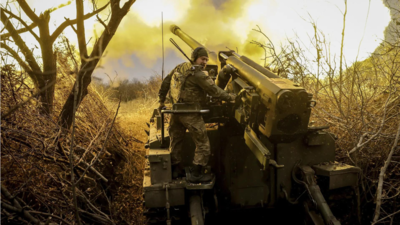US Treasury Secretary Janet Yellen voiced optimism about the progress of Group of Seven talks on a plan to use future profits from frozen Russia assets to help Ukraine, a move the group’s leaders will ultimately decide in June.
There’s a “general positivity about the overall approach” although important technical issues still needed to be resolved, Yellen said in an interview Friday with Bloomberg News.
“I’m feeling pretty good about the conversations that we’ve had,” Yellen said on the sidelines of a G-7 finance ministers and central bank governors meeting in Stresa, Italy.
With Russia’s military offensive gaining ground, focus has shifted on securing medium-term assistance for Kyiv and sending a strong signal to Moscow that G-7 allies are committed to supporting Ukraine for, as President Joe Biden and Yellen have often said, “as long as it takes.”
The US has been pushing for the G-7 to leverage future revenue generated from about $280 billion in Russian central bank funds, most of which lies immobilized in Europe. The plan, which Yellen said she doesn’t think needs approval by Congress, could unlock an aid package of as much as $50 billion for Ukraine.
Read More: Ukraine Aid From Russian Assets Is Moving Forward in G-7 Draft
Yellen’s comments come as finance ministers from the group are set to discuss the plan in detail on Saturday with the aim to agree on a set of options for their leaders, who will make a final decision when they meet next month.
According to a draft of their communique seen by Bloomberg – and which could still change – the ministers will say they discussed potential schemes to bring forward the revenues stemming from the immobilized assets and reaffirm their position that the funds will remain frozen until Russia pays for the damage it has caused to Ukraine.
Risk Sharing
Even as the G-7 is moving closer on the broad strokes of the plan, many critical technical details are still being negotiated, including the exact mechanism of the loan, the size of the amount that will be raised upfront and the way the funds would be managed and distributed.
Crucially, the G-7 will need to agree on how the risk will be shared, an issue that has been front of mind for the European Union, where the bulk of the assets are based.
Should the war come to an end and some kind of peace deal is struck with Russia, with Moscow agreeing to pay for Ukraine’s reconstruction, that would raise questions over whether the assets would remain frozen and what guarantees would be provided for repaying the loan if not.
Yellen downplayed the risks of such a plan, stressing the odds are high that the assets will remain immobilized for some time.
Still, she signaled openness to sharing the risk with peers across the G-7.
“A workable approach is that whatever risks there are, are shared sort of in proportion to the amounts that people contributed to the loan,” she said.
This article was generated from an automated news agency feed without modifications to text.
You are on Mint! India’s #1 news destination (Source: Press Gazette). To learn more about our business coverage and market insights Click Here!









